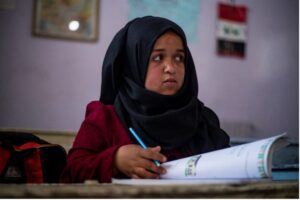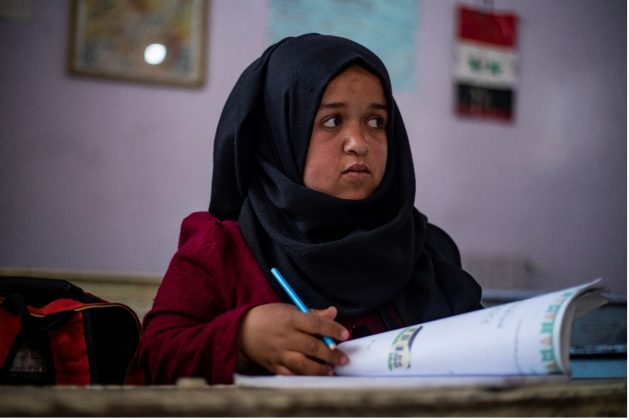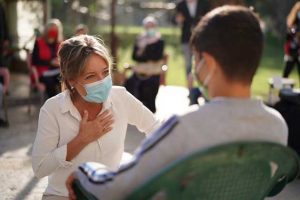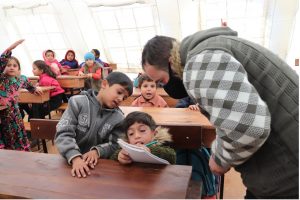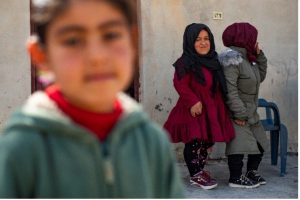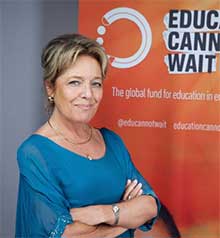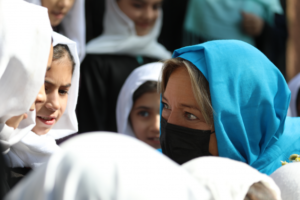
Civil Society, Development & Aid, Editors’ Choice, Education, Education Cannot Wait. Future of Education is here, Featured, Headlines, Human Rights, Humanitarian Emergencies, Inequity, Middle East & North Africa, TerraViva United Nations
Education Cannot Wait. Future of Education is here
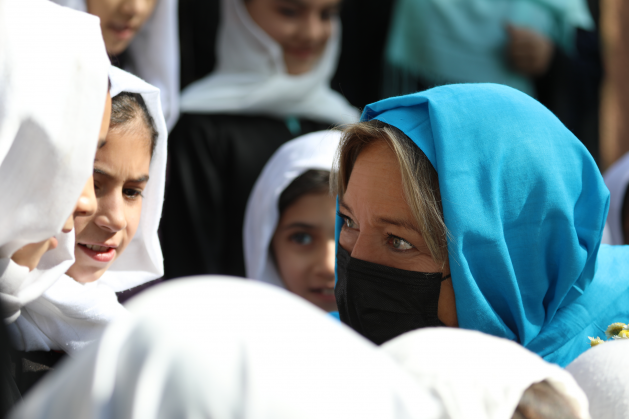
Yasmine Sherif, Director of Education Cannot Wait, is welcomed by teachers and students at a girls’ primary school in Kabul, Afghanistan.
Credit: Omid Fazel/ECW
– After leading a landmark, first-ever all-women mission to Afghanistan last week, Yasmine Sherif, Director of Education Cannot Wait, the United Nations global fund for education in emergencies and protracted crises, says that schools must reopen for all children and that girls, in particular, must be able to return to secondary school classrooms.
Sherif visited a girls’ school in Kabul and spoke to students, female teachers, and administrators as part of her Afghan mission. She also met with the de facto education authorities at the Ministry of Education to advocate the right of all children to quality education. The ECW mission comes less than a month after ECW launched a US$4 million First Emergency Response grant to provide ‘quality, flexible learning and psychosocial support for children and adolescents caught in the escalating crisis.
“We need to act fast. When you are in the midst of a humanitarian emergency like Afghanistan, where there is no money in circulation, starvation is a very real fact and poverty is extreme,” Sherif told IPS. “Schools need to continue to reopen and education must be sustained. Not only at primary school levels but through secondary schools – and girls have to go back to secondary schools.”
Sherif, a human rights lawyer, worked in Afghanistan in the early 1990s. She was part of a mission to the country after the first Taliban takeover in 1999 and has visited the country periodically over the last 20 years. She spoke to IPS about her observations from this ground-breaking mission to Kabul a few days ago – the first of its kind since the Taliban take-over in August.
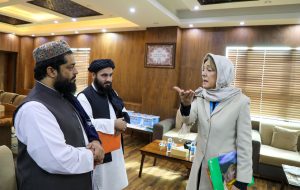
Yasmine Sherif, Director of Education Cannot Wait, meets with de facto education authorities in Afghanistan.
Credit: Omid Fazel/ECW
“There are more women on the streets of Kabul today. I even saw women demonstrating for health care. I visited a girls’ primary school whose teachers and administration were all women,” Sherif said.
“The school’s headmaster is a woman, the school’s doctor is a woman, administrators and teachers are women. There are educated, strong women who are working, but they do not get salaries, because there are no salaries for basic services as a result of the funding freeze to Afghanistan.”
The World Bank, the International Monetary Fund, and the European Union are just a few of the international bodies that have cut off Afghanistan’s access to financing. According to the World Bank, the country relies on grant funding for more than 75 percent of public spending, with expenditure of US$411 billion and government revenue of US$2.5 billion.
With that grant funding frozen, the country is on the brink of economic collapse.
Sherif is appealing for direct funding through UN agencies like ECW and UNICEF, which has the proven mechanisms in place to ensure that funds are used to support teachers and students.
“Teachers are not being paid. UNICEF has a very strong process on the ground. If money were to be given today or tomorrow to pay all teacher salaries, UNICEF has capacities in place to deliver on that funding, even if this would typically have been done through the World Bank or other development actors, but now we are in humanitarian crisis so you cannot use regular development aid approaches,” Sherif told IPS.
“The same goes for all UN agencies like the World Food Programme and UNHCR, the UN Refugees agency. Funding can be channeled through them directly to implement aid programmes. Nothing needs to, nor will go through, the de facto authorities.”
The ECW Director is cautiously optimistic following her meeting with the de facto education authorities, to whom she appealed for a return to secondary school for girls.
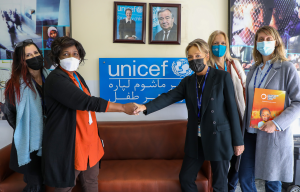
UNICEF Deputy Representative Alice Akunha and Chief of Education Jeannette Vogelaar greet the Education Cannot Wait all-women delegation to Afghanistan, led by Director Yasmine Sherif and her colleagues, Michelle May and Anouk Desgroseilliers.
Credit: Omid Fazel/ECW
“Primary schools have opened for girls’ education and for girls’ secondary education, the de facto authorities told us that they are developing a plan. I stressed that the girls have no time to lose and that the benefits of educating girls are crucial to the future of the country,” she said.
The ECW Director has commended international and national civil society organizations that now work with religious scholars as they negotiate the resumption of secondary school education at the grassroots level. “By bringing an Islamic scholar with them, these NGOs have actually managed to build trust. So secondary schools have opened in some provinces, a few in the north and a few in the south. It is important to stand firm on human rights and girls’ rights, but you must also have the ability to build trust as well,” she said.
ECW is already prepared to swiftly scale up its support and adapt its programming in Afghanistan. New challenges and more children in need of help demand pivoting and quick response. Sherif says ECW was created for crises like these.
“As the UN’s global fund for education in emergencies and protracted crises, we are agile, quick, and flexible. We use decades of lessons learned across the UN system to respond to crises. Traditional development aid modalities that are not crisis-sensitive are not going to work; not in this situation,” she said.
Sherif says that an estimated $1 billion is urgently required for United Nations agencies and international and local NGOs to meet the pressing education needs across the country.
“It’s about how can we save the Afghan population from a humanitarian catastrophe. How can we ensure that every Afghan girl and boy in the country can go to primary and secondary school? It’s about how we can ensure that teachers receive their salaries, so they are able to continue to teach. It is about providing teaching and learning materials and safe learning environments. It is about ensuring that the rights of adolescent girls to access education are fulfilled. That is why it was important for us to do an all-women mission to Afghanistan and to make clear where we stand on girls’ education.”
Sherif is hoping that the visit can give the world an open window view into life in Afghanistan and provide concrete recommendations for international aid to be immediately scaled up and invested to support quality education for both girls and boys.
“Afghanistan cannot wait. The girls of Afghanistan cannot wait. Education cannot wait.”

